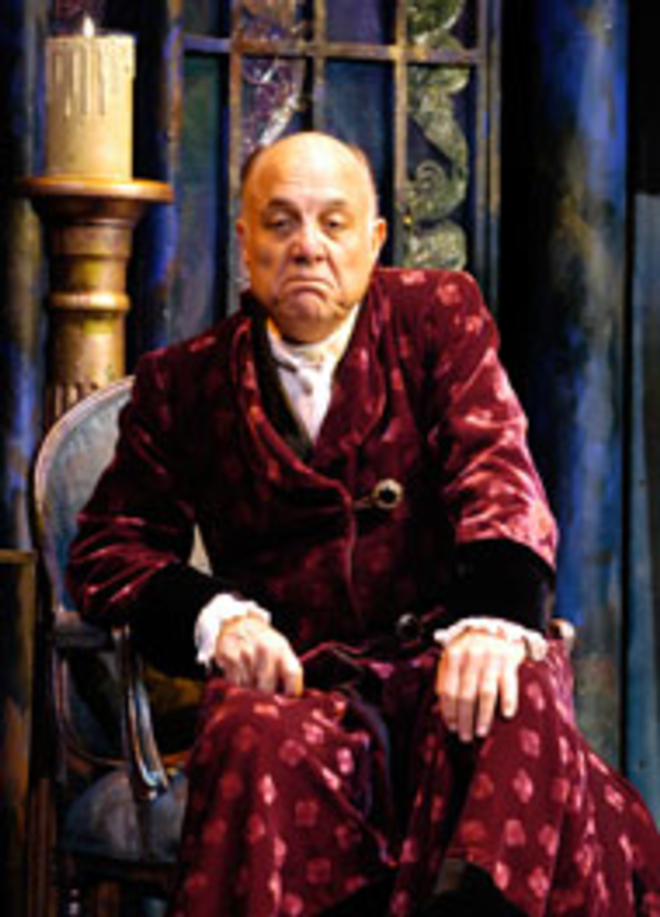
Thomas Holcroft is one of those writers who was famous — and eventually notorious — in his own day, and whom history has since managed to forget. A shoemaker's son, he was born in 1745, worked as everything from a stable hand to a traveling actor, taught himself to read French and German, and eventually began adapting foreign plays for the English theater.
His first successful play, Duplicity, premiered in 1771, and his most famous work, The Road to Ruin, enjoyed a long run at the Covent Garden Theatre in 1792. Holcroft authored the first English translation of Beaumarchais' The Marriage of Figaro — he had to work from his memory of seeing the play in Paris because no copy was available — and he also helped ensure that another revolutionary work, Thomas Paine's Rights of Man, was published in spite of government opposition.
Eventually Holcroft's democratic tendencies got him into trouble: He was indicted for High Treason in 1794 because of his involvement with societies favoring reform of the British constitution. Although he was acquitted, the charges damaged his standing as playwright; even the production of one play under an actress-friend's name didn't bring him much income. He died, in 1809, after a long illness; before then he must have had more than a glimpse of the obscurity that would come, eventually, to cover his name.
Well, the Asolo Theatre has now decided to revive The Road to Ruin. And though it's fascinating to discover what earlier audiences considered good theater, the work never really justifies its resuscitation. Essentially, this is the kind of melodrama that puts its characters in difficult situations, makes you wonder how they'll escape, and then provides that escape — all without challenging audience principles or values. That Holcroft was a political radical, that he translated Beaumarchais and championed Paine, is nowhere in evidence during the two hours of The Road to Ruin. In fact, if one had to guess what really mattered to Holcroft — based on the play and nothing more — one would have to say: money. Because the borrowing, inheriting, stealing, gambling and marrying of money is what this work's really about, and there's not the hint of a critique of anyone's capitalism along the way.
As melodramas go, however, this one does have some redeeming features. There's a pleasing amount of gentle comedy throughout, and there's an amusingly drawn father-son relationship. There's a silly elderly woman who lusts after a young man, and there's a fun-to-hate villain who's always filling his deep pockets. So yes, this is a play without real substance, important ideas. But it's not badly crafted, and not without some fine moments. Just don't expect glimmers of Ibsen, Shaw or Brecht.
The story The Road to Ruin tells is about Harry Dornton and his banker father. Harry's a wastrel, an inveterate gambler who loses big; he's also a partner in his father's bank. When the play starts, Harry has just racked up some really immense gambling debts, and it seems that the result will be the bankrupting of the family business. Penitent Harry hits on a solution: he'll marry the wealthy widow Warren and use her money to save his father. The trouble is, Harry's really in love with the widow's daughter, Sophia. Will Harry have to accept a loveless marriage in order to bail out dear old Dad? Or will someone come up with a solution that saves Dad, marries Sophia and Harry and avoids the depredations of the evil moneylender Mr. Silky?
As you can see, there's lots of opportunity for suspense here; after all, these questions, although ultimately meaningless, do keep us in our seats. And keeping us watching, too, is a superb production by the entire Asolo crew: actors, director and designers.
It's hard to know where to start praising the actors. Bradford Wallace as the elder Dornton is wonderfully conflicted, resolving at one moment to disinherit his son, then immediately being overtaken by filial love and fatherly sympathy. Also first-rate is Sharon Spelman, who as the lusty, calculating Widow Warren, can hardly wait for the chance to have young Harry in her boudoir. Gabriel V. Ortiz as Harry is a spendthrift with a heart of gold, a genuinely likable prodigal who's ready to sacrifice his own interests in order to rescue his father. And Luciann LaJoie as the beautiful Sophia is charmingly implacable, as committed to self as anyone on stage, but well-practiced at appearing merely simple and prudent.
Fine performances also are turned in by John Sterling Arnold as the Scrooge-like Mr. Sulky, Douglas Jones as the nefarious Mr. Silky (the resemblance of the names figures importantly), Brian Graves as the high-spirited Jack Milford, and Francisco Lozano as the Widow Warren's second-best suitor. Eberle Thomas' direction — he also adapted the play, reducing it from five acts to two — finds comedy at every turn, and Michael Lasswell's garish set — a hulking blue and gold concoction — radiates the unashamed capitalism of an earlier era. Finally, Vicki S. Holden's period costumes couldn't be more attractive.
I'm not sorry I saw The Road to Ruin; as a theater critic, I'm always trying to catch up on what I've missed from the last 2500 years of drama. But if you're not a critic or antiquarian, I'm not sure the play's for you. It's not more entertaining than a good TV or movie thriller; and historically, all it tells us is that people in 1792 were as obsessed with money as people are now. The author Thomas Holcroft is interesting, though: a play about him would surely speak to us more importantly than does The Road to Ruin. The man who translated Figaro, who defended Tom Paine, who spoke out for the American and French Revolutions: yes, a play about him could make for a meaningful evening of theater.
Let's have more evenings like that; and we won't mind a bit the forgotten melodrama that we're missing.
Performance Critic Mark E. Leib can be reached at [email protected] or 813-248-8888 ext. 305.














